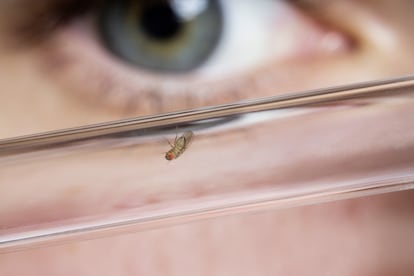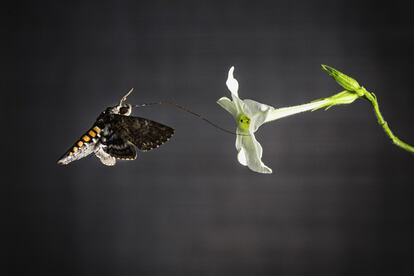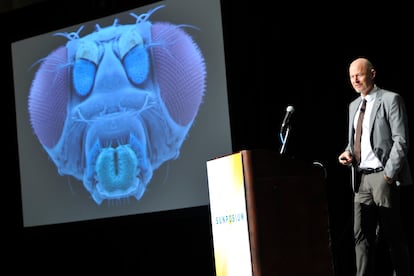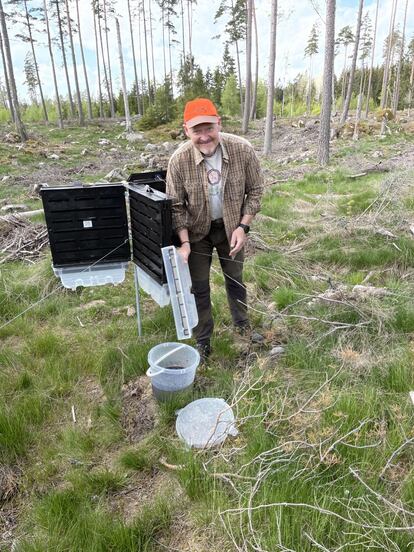Bill Hansson: ‘Don’t buy pheromones to get laid… you’re better off working on your personality’
The scent expert from the Max Planck Institute for Chemical Ecology spoke with EL PAÍS on the relevance of smell, the most underrated of the human senses

A thousand years ago, there were no cars, airplanes or factories. For our ancestors, the past would have smelled quite different from today.
Bill Hansson is fascinated with olfaction – the action or capacity of smelling. The 63-year-old Swedish neuroethologist, while studying the behavior of animals, has come to understand the complex sensory mosaic that results from smell.
Hansson, who directs the Max Planck Institute for Chemical Ecology’s Department of Evolutionary Neuroethology in Jena, Germany, sat down with EL PAÍS to talk about the importance of smell, the flawed reasoning behind the perfume industry and how pollution is changing the chemical dynamics of animal and plant ecosystems. The author of Smelling to Survive: The Amazing World of Our Sense of Smell, says that climate change is affecting the smell of our environment – and not without consequences.
Question. What is it about smell that affects humans so much?
Answer. Smell is really special because it’s multidimensional. When we think of seeing or hearing, it’s like a wave, right? But when it comes to scent, each molecule is unique. You have 350-400 receptors in your nose. They’re like the keys of a piano: there are millions of melodies to play, depending on combinations.
Q. And we still do not fully know how the process of smelling takes place?
A. We don’t know it all. Odorous molecules are all around us. They reach our nose, which is a receptor, so it’s like a key fitting into a lock, triggering a whole neurochemical process. There are millions of receptor cells embedded in the mucosa. From there, the information – which is a chemical signal – becomes electrical, travelling through the olfactory nerves to the brain. Taking a detour, it goes to the next level; it reaches the limbic system, where the hippocampus – which is extremely good at evoking memories – and the amygdala – very involved in emotions and sexuality – are located. There are deep links between smell and feelings.
Q. Because there’s nothing compares to smell, except maybe music?
A. it is probably that it’s a very, very ancient sense. It’s the first one we had. So it’s very deep in our brain, really deeply connected to all the functions.
Q. You have written that scent is the reality in which many species move.
A. There are animals that understand smell in a totally different way, because they are a thousand times more sensitive than us. If you walk with a dog in a city park every day, the same route becomes very boring for you… but for the dog, every day brings something different. With his developed nose, he can see the past, detect other animals… he captures a whole story.

Q. Is how we perceive the world limited compared to other animals?
A. Every species is limited. Even if we lived in the same environment as a dog, our brain cannot understand its sensory world. Imagine a sense of smell so developed that it can detect a corpse submerged 20 meters under water. Birds and fish, along with many other different species, use smell as a reference when they move. We can’t understand that, and that’s why it fascinates us.
Q. Scent is an ancient ability… it has arisen at different evolutionary points in time because of its usefulness.
A. Yes, exactly. In evolutionary terms, we call this a “convergence.” Scent has come about from different starting points in different species… but in the end, it still has to perform the same activities: pick up molecules, send them to the brain for interpretation and adjust behavior accordingly.

Q. The automatic ability to access forgotten memories can be inconvenient, especially in cases of post-traumatic stress.
A. Yes, of course. While smelling a familiar scent, you can activate [trauma] by unconsciously recalling a bad memory. A smell can trigger anything: it transports you to a place regardless of where you are, without you being able to do anything about it.
Q. And despite being something so powerful, we seem to be incapable of describing a specific fragrance.
A. True. When we try to, we always do it via comparison. We say “it smells like banana, vanilla or… like shit.” We lack the vocabulary to describe smells… but there is also a cultural factor to this difficulty. We did experiments with Malaysian natives and they actually have specific words for the most important smells. For instance, to warn about the presence of a tiger through its feces or urine, they don’t have time to say, “Oh, it smells like a tiger” and describe it. No, they mention a specific word in their language and everybody knows that they have to get out of there!
Q. Unlike sight or hearing, a sense of smell is something that we don’t value until we lose it. This happened during the COVID-19 pandemic, when we began to talk about anosmia… the total loss of smell.
A. Before the pandemic, there was simply a bit of curiosity about this particular sense. But after the cases appeared, even if patients eventually recovered 90% of their ability to smell, they suddenly realized how important it was. Why? Because taste was also lost.
Q. You have writte that if you lose it, you lose the best part of life.
A. Smell and taste are important factors in a person’s quality of life. Be it good food, good beverages or good sex, a lot of our experiences depend heavily on smell. There are a lot of olfactory interactions that are interconnected… when one of them suddenly disappears, that’s a bad sign, because you can’t really enjoy your favorite experiences like before. If you live with a partner or children, many smells merge into a common aroma. You recognize it – it’s like a strong chemical bond. You feel safe and loved. By losing the ability to feel it, relationships can even be broken.
Q. A sense of smell can also disappear when one suffers from neurodegenerative diseases.
A. The complete loss of smell – or even a pronounced deterioration in the ability to smell – is one of the first signs that something is wrong. Today, it’s used as an early diagnosis for Alzheimer’s and Parkinson’s. It’s reasonable to think that there’s a link between the olfactory sensory nerves and the cerebrospinal fluid, which bathes the entire brain and spinal cord, and is responsible for cleaning waste from cells via the mucous glands. If it presents any type of damage, it could trigger a domino effect with neurological consequences.
Q. Can you die from anosmia?
A. Indirectly, perhaps. The loss of smell is a brutal hit to our existence – it affects mental health and makes us feel truly lost. The olfactory system is a chemical gauge of quality, but also of danger. Without realizing it, we are constantly monitoring our surroundings with every breath we take. If our nose detects smoke at night, it alerts you. Just like with rotten food. The most likely cause of death for people with olfactory loss is a gas leak, or eating spoiled food.

Q. The obsession with manipulating the human scent has created a massive industry. The perfume sector nets between $50 to $90 billion each year. Is this due to our vanity? Are we trying to hide our stench and seek pleasant sensations?
A. This is part of an ancient tradition. There are records in India, Egypt and Mesopotamia of perfumes. The sector reached its peak in the 18th century, during the reign of the French King Louis XV and Madame Pompadour, who promoted it as a trend. Noblemen and women tried to differentiate themselves from the general population by smelling different. And then, the modern perfume industry was invented. Today, it’s one of the largest industries in Europe, the flagship being the International Flavors and Fragrances Consortium (IFF), which sells scents not in tiny vials, but in tankers. A multi-billion dollar business, based on the desire to make us smell like something other than ourselves.
Q. You actively discourage the purchase of any product that promises to get you a romantic partner (or just sex) simply by spraying your entire body, or parts of your body.
A. It doesn’t work. And I want to be very clear: of course, we do have natural pheromones. But humans are also highly complex. When a female dog is in heat, she emits pheromones to a male dog – an unequivocally sexual signal, with both dogs only thinking about mating. They forget about everything else. They seek to have sex as soon as possible and as quickly as possible. If we go further, to the insects, this is even more pronounced. Humans are animals too and we are also moved by sex… but we’ll never be like that. We’ll always have many, many other things that affect us from childhood, a whole bunch of emotional baggage, everything you’ve experienced. Other animals don’t reflect much on what happened last year: only on the new mating season. We, on the other hand, ruminate on anything that has happened to us… most often on bad experiences with other people.
There are scammers who try to sell you artificial pheromones over the internet in order to manipulate you. Remember, none of it works. People are extremely complicated creatures – it takes a lot more than a smell to get laid. You’re better off working on your personality.

Q. You’ve written a lot about the smells of the future… to what extent is climate change transforming ecosystems at an olfactory level?
A. I’ll give you an example. Industries use a lot of plastics. When they decompose, they give off an aroma that is similar to that emitted by areas with a large amount of fish. So, when a bunch of plastic is sitting in the middle of the ocean, it gets ingested by turtles, seals, whales, pelicans… they eat plastic all the time, because it smells like regular food.
Here’s another example. In an experiment that we carried out, we verified how smog modified the aroma of a flower. In a contaminated area, the smell that it gives off is so different that insects no longer recognize it. They don’t carry out the pollination cycle. If we keep changing all the smells and modifying all the molecules that surround us, we’re going to end up with a totally new olfactory world.
Q. Why is it that when we imagine the future in virtual worlds, we never consider smell as another immersive mechanism? Virtual reality headsets rarely stimulate the nose.
A. That’s also a whole industry. I predict that it will come. A complete virtual reality should take all senses into account if you truly want to achieve total immersion.
Tu suscripción se está usando en otro dispositivo
¿Quieres añadir otro usuario a tu suscripción?
Si continúas leyendo en este dispositivo, no se podrá leer en el otro.
FlechaTu suscripción se está usando en otro dispositivo y solo puedes acceder a EL PAÍS desde un dispositivo a la vez.
Si quieres compartir tu cuenta, cambia tu suscripción a la modalidad Premium, así podrás añadir otro usuario. Cada uno accederá con su propia cuenta de email, lo que os permitirá personalizar vuestra experiencia en EL PAÍS.
¿Tienes una suscripción de empresa? Accede aquí para contratar más cuentas.
En el caso de no saber quién está usando tu cuenta, te recomendamos cambiar tu contraseña aquí.
Si decides continuar compartiendo tu cuenta, este mensaje se mostrará en tu dispositivo y en el de la otra persona que está usando tu cuenta de forma indefinida, afectando a tu experiencia de lectura. Puedes consultar aquí los términos y condiciones de la suscripción digital.








































